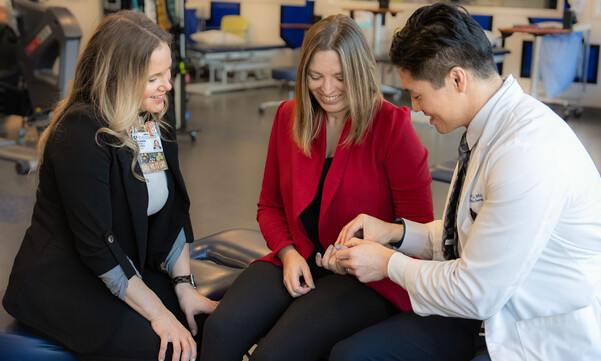Nerve transfer surgery can restore sensation, mobility, and pain-free function to people with nerve injury whose nerves can’t recover on their own. Here, Duke Health's Neill Y. Li, MD, a peripheral nerve and orthopaedic surgeon who specializes in nerve transfer surgery, answers some commonly asked questions.
What is nerve transfer surgery?
In nerve transfer surgery, we locate a redundant or expendable healthy nerve. We move that donor nerve to the damaged nerve as close as possible to the muscle whose function we want to regain. This can help with weakness, numbness, and pain in the muscles.
Is nerve transfer surgery painful?
There is not a lot of pain from the nerve itself. You may feel pain at the incision site during the first few days.
What are the risks of nerve transfer surgery?
The biggest risks are either that the nerve does not recover or a complication occurs. Complications usually stem from the wrong donor nerve being selected. If that happens, you might experience weakness or loss of function in the area around that donor nerve. We methodically monitor nerve and muscle activity during the operation to be sure that we’re finding a truly expendable nerve. There are also big blood vessels that run around nerves which can cause bleeding if they are injured during the procedure. There is also a risk of wound infection, which is common across all surgeries. We only perform the surgery when we believe that the benefits outweigh the risks.
How long does nerve transfer surgery take?
One nerve transfer takes about two hours, but some people may need multiple transfers.
What conditions can be treated with nerve transfer surgery?
Nerve transfer surgery is often used for paralysis associated with brachial plexus and peripheral nerve injuries as well as for people with pain following limb amputation. Nerve transfer surgery can also treat spinal cord injuries and brain injuries that may lead to limb spasticity. It is also being used to help people with C5 and C6 palsy -- a complication of spine surgery that causes shoulder and elbow paralysis. It might be an option for people with nerve injuries whose symptoms haven’t improved with other treatments.
When should I consider nerve transfer surgery?
The sooner you come to see us, the better your chances are for a successful outcome. We really try to do this surgery within a year following the injury. We can expand upon that depending on your age and general health, but within a year is best.
Where should I go if I need nerve transfer surgery?
Find a center that can provide the highest level of electrodiagnostic evaluation to show that your nerve is no longer improving on its own. At Duke, we closely follow our patients with nerve injuries to monitor how those nerves are recovering. We offer a holistic approach that considers life before and after the surgery. For example, Duke has access to occupational and physical therapists who specialize in nerve-related injuries. They can help get your joints and muscles in good shape before surgery, and also provide therapy after surgery, to encourage functioning. Because recovery can be a long and difficult journey, we also connect you to psychologists, psychiatrists, and social workers.
What is the recovery process like for nerve transfer surgery?
For the first two weeks, we immobilize the area, to help the nerves heal together. Then you’ll come back to see us and you’ll also see physical and occupational therapists. They’ll personalize your program and see you as often as you need for the next three months. Then we’ll assess how you’re improving, and review your concerns. Some patients may see some improvement but most do not. By six months, you should see some pretty good function or improvement that continues for the rest of the year. This is a long recovery. It can take up to two years to see an improvement and gradual progress. If you’re not happy with your improvements, we can talk about whether a tendon or a muscle transfer would make sense, and what those options look like.
Why should I choose Duke for my nerve transfer surgery?
We’re innovative in our outlook and our practices. For example, rather than having the surgeon sew nerves together, we use electrical stimulation because it’s proven to aid nerve recovery. We are researching how we can help nerves recover faster and give them the best chance to heal. Our team includes different specialists that address all facets of the surgery and the recovery. Finally, nerve transfer surgery is a long journey, and we are here with you throughout the process. If the nerve transfer surgery is not as successful as we hope, we can offer a full spectrum of options to try next.





